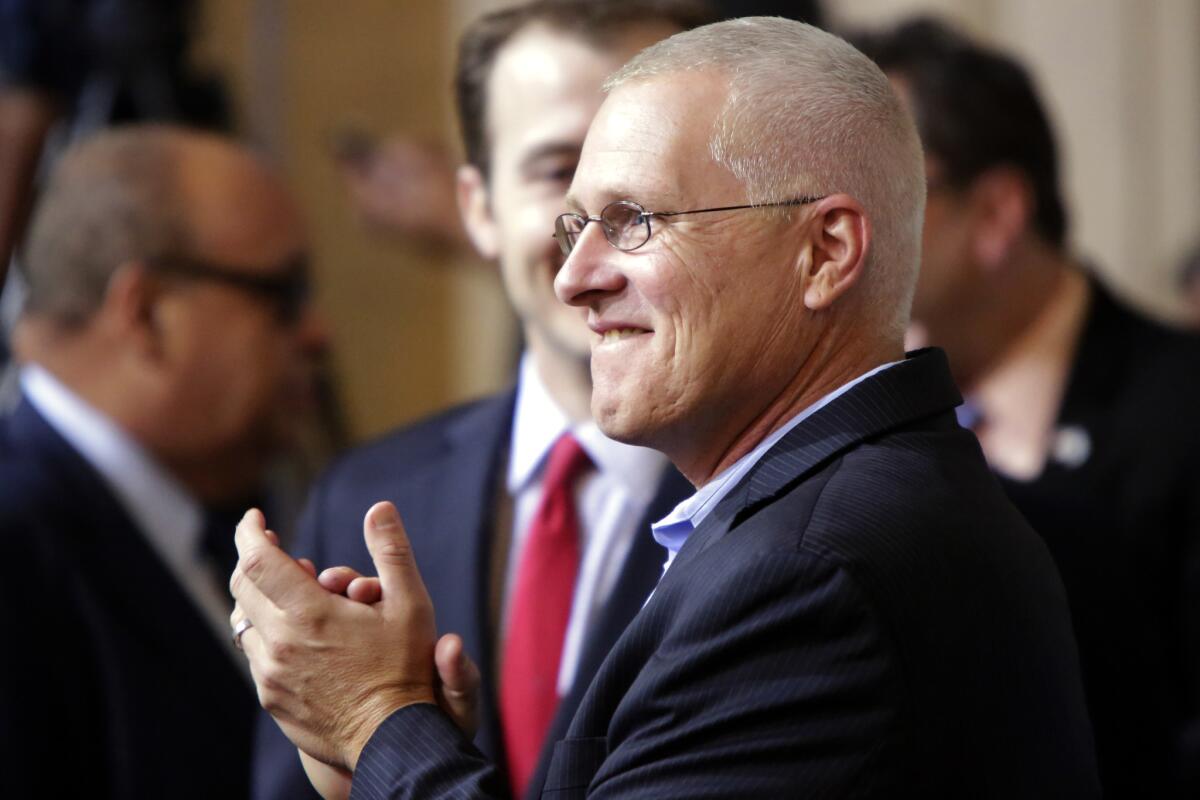Taxpayers should foot the bill for ‘clean money’ campaigns, L.A. council members say

Three members of the Los Angeles City Council called Friday for full taxpayer financing of city election campaigns, resurrecting an idea that was proposed at City Hall nearly three years ago but went nowhere.
Councilmen Mike Bonin, Paul Koretz and David Ryu said they want the city’s policy analysts to determine how much a “clean money” system would cost and where the money would come from.
Under the proposal, candidates for 18 city offices would receive taxpayer funding for their campaigns as long as they collect a significant number of low-dollar donations from their constituents, refuse to collect “special interest” contributions and decline to spend a significant amount of their own funds.
The proposal was revived two days after the council voted to prohibit real estate developers who have projects pending before City Hall from giving to the campaigns of city candidates. Those limits will not apply to candidates in either the 2020 campaign or the 2022 primary election.
Council members overwhelmingly rejected a proposal from Ryu to have the rules enforced throughout the 2022 campaign, when as many as seven council members — including Bonin — could be up for reelection. Critics had argued that the later implementation date would allow incumbent council members to preserve a key advantage over their challengers: fundraising from real estate interests.
Wednesday’s debate over new campaign finance rules featured unusually sharp remarks from council members, including a warning from Bonin that the council needed to stop approving “piecemeal crap.” In a message to his constituents on Friday, Bonin announced he would push once again for full public financing.
“The influence of money in our political system casts a long, heavy shadow over our democracy,” he said.
Ryu welcomed Bonin’s proposal, saying taxpayer financing of election campaigns would let candidates spend more time talking to voters.
“It will give the candidates the ability to not have to go after the almighty dollar, but instead focus on the issues and the priorities of the community,” he said.
Los Angeles already provides some taxpayer money to campaigns through its “matching funds” program, which aims to help level the playing field for eligible candidates by bolstering their private donations with public funding.
Full public financing of campaigns has been floated repeatedly in Los Angeles. Councilman Bill Rosendahl put forward the idea in 2005, without success. Bonin, who worked for Rosendahl and replaced him on the council, brought the idea back in 2017, saying such a system should be put before the voters.
The council never took up the proposal and it quietly died in January.
One activist said he would be open to another public discussion of full public financing. But he said he fears the proposal will be used to change the narrative at City Hall, allowing council members to downplay the fact that they recently killed or tabled other serious reforms.
“If this is the the kind of thing that’s going to languish ... then it’s not worth the time of Ethics Commission staff or the advocates to work on it,” said Rob Quan, an organizer with the group Unrig L.A., which is focused on reducing the influence of special-interest money in local elections.
Although council members unanimously backed the new developer donation limits, they shelved or failed to act on several other proposals, including a measure to bar elected officials from raising money for their favorite charities from donors with business before City Hall.
Elected officials are currently required under state law to report any donation of $5,000 or more that they raise for nonprofits or foundations.
Council members also have not acted on a major proposal backed by the Ethics Commission: prohibiting donations from corporations and other groups. Backers of the plan argue it would prevent donors from giving through limited liability companies and other entities that can make it difficult to determine who is behind a contribution.
Ryu, in an interview, said he believes this year’s debate over developer donations paved the way for council members to revive the idea of full public financing.
When the “clean money” proposal was introduced last time, “it didn’t have even a spark of a discussion,” Ryu said.
Jay Handal, who serves on the Neighborhood Council Budget Advocates, said he fears a full public financing system would end up pushing more money into “independent expenditure” committees, which can raise and spend unlimited amounts to back their chosen candidates.
“If I’m a big donor, I’m going to go to a PAC and give them as much money as I want and it’s just going to make it worse,” he said.
David Hersch, deputy chief of staff for Koretz, said his boss also wants to look into new restrictions on independent expenditure committees to address that very issue.
Campaign finance experts have said repeatedly that the city cannot legally regulate donations to such groups.
More to Read
Sign up for Essential California
The most important California stories and recommendations in your inbox every morning.
You may occasionally receive promotional content from the Los Angeles Times.












